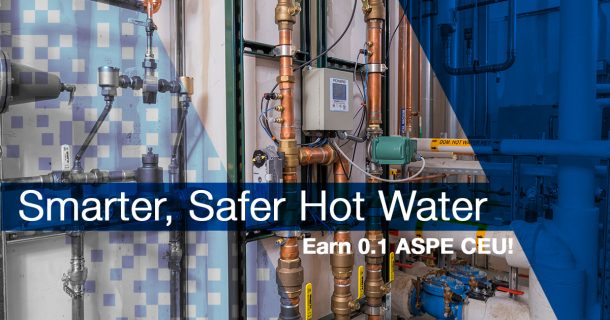Building information modeling (BIM) helps improve accuracy, efficiencies, job-site safety, productivity, and even profitability potential on commercial projects. With the use of BIM expanding, many contracting firms are now outsourcing work due to resource constraints. However, before partnering with a BIM services provider, it’s important to do your research. Because BIM is a relatively new Read more
American Society of Plumbing Engineers

Building information modeling (BIM) helps improve accuracy, efficiencies, job-site safety, productivity, and even profitability potential on commercial projects. With the use of BIM expanding, many contracting firms are now outsourcing work due to resource constraints.
However, before partnering with a BIM services provider, it’s important to do your research. Because BIM is a relatively new concept to the construction industry, experience is in short supply. Here are three points to consider along with an informative webinar series to provide guidance when considering a partnership with a BIM services provider.
Location
One of the most important points to consider when choosing a BIM services provider is their location. Some companies are located overseas, which can make live interactions or collaboration challenging. Be sure to choose a provider located in your region, or at least in your
country, so collaboration can happen in real time.
To find out how BIM services providers can benefit your business, watch this Introduction to Uponor BIM Services webinar.
Experience
Ensure the team you’re considering has the necessary knowledge and experience with codes and standards in your jurisdiction as well as specific construction practices in your area. For example, certain commercial projects, such as hospitals, may have certain construction methods that must be adhered to for code. It’s vital the BIM services team you’re partnering with knows these important details.
For information about what BIM services providers can offer, check out this Benefits of Partnering with Uponor BIM Services webinar.
Industry Affiliations
Be sure to partner with a team that has affiliations with industry organizations, such as the American Society of Plumbing Engineers (ASPE), the American Society of Heating, Refrigeration, and Air-Conditioning Engineers (ASHRAE), and the Mechanical Contractors Association of America (MCAA). This will ensure they’re up to date on all the important industry trends and application practices your project may require.
Not all BIM services providers are the same. Discover the Differentiation of Partnering with Uponor BIM Services with this final webinar in the series.
To learn more or to get started on your next project, visit uponor.com/bimservices.

The American Society of Plumbing Engineers (ASPE) and the Plastics Pipe Institute, Inc. (PPI) today announced a Memorandum of Understanding (MOU) that will advance the benefits that both organizations provide to the plumbing industry. David Fink, President of PPI, and Billy Smith, FASPE, Executive Director/CEO of ASPE, made the joint announcement virtually from their respective Read more
The American Society of Plumbing Engineers (ASPE) and the Plastics Pipe Institute, Inc. (PPI) today announced a Memorandum of Understanding (MOU) that will advance the benefits that both organizations provide to the plumbing industry. David Fink, President of PPI, and Billy Smith, FASPE, Executive Director/CEO of ASPE, made the joint announcement virtually from their respective headquarters. ASPE is the international organization for professionals skilled in the design, specification, and inspection of plumbing systems. PPI is the leading North American trade association representing all segments of the plastic pipe industry.

“For the past 70 years, PPI and our members have embarked on research projects that have led to the creation of many manuals and standards, and influenced codes,” Fink stated. “We have always sought ways to work with other like-minded groups to amplify the benefits to the industry. Our work with ASPE has been highly rewarding, and we are looking forward to doing even more. For example, we will explore how to best educate legislators on issues important to the members of each organization, plus promote mutually beneficial positions during the development and passage of state and federal legislation.”
One of the key components of the MOU is advocacy. Where mutually beneficial, and to the extent allowed by laws and corporate policies, ASPE and PPI will work together on common public affairs goals and ideologies.
Billy Smith stated, “Being the international organization for professionals skilled in the design, specification, and inspection of plumbing systems, ASPE is dedicated to the advancement of the science of plumbing engineering, to the professional growth and advancement of our members, and to the health, welfare, and safety of the public. Having the opportunity to continue our core goals by collaborating with industry partners through advocacy for the benefit of all is a valuable asset.”

“PPI has enjoyed a close relationship with ASPE for a number of years,” stated Lance MacNevin, P. Eng., Director of Engineering for PPI’s Building & Construction Division (BCD). “ASPE’s scope of work related to plumbing and fire protection systems is very much in line with PPI BCD’s scope of work. Since becoming a professional member of ASPE in 2015, I have benefitted from the resources made available to their members and participated in the ASPE Main Design Standards and Legislative Committees. Also, PPI has been registered with ASPE as a continuing education CEU Provider since 2016. This has helped PPI to connect with plumbing engineers through ASPE conferences and Chapter meetings. I encourage more PPI members to join ASPE.”
Part of PPI’s mission is to educate the plumbing industry about correct applications for plastic pressure piping systems using CPVC, HDPE, PEX, PE-RT, PP-R, and PP-RCT. “It is important that plumbing engineers have access to accurate information about these pipe materials. There are ideal applications for each of these materials when utilized correctly,” MacNevin said. “The MOU with ASPE will help to accelerate our goal to deliver accurate and thorough information about these systems, so that the best pipe material can be selected for an application.”
Other areas addressed in the MOU include education, technical activities, and research.
“This Memorandum is certainly very exciting,” MacNevin continued. “It clearly defines our goals, outlines the initiatives, and sums up the strong support structure of why and how we have forged this agreement. The collaborative work of ASPE and PPI members, based on their years of experience and knowledge, is intended to benefit the plumbing community and the health, safety, and welfare of the public.”
“The wealth of knowledge contained in both of our organizations is second to none, so we are looking forward to expanding our relationship with PPI to help increase the technical knowledge of the industry,” Smith said.
Additional information can be found at plasticpipe.org/building-construction or at aspe.org.

Watts has announced the next installment in a series of webinars for their engineer, architect, designer, and facility manager customers: Smarter, Safer Hot Water, to be broadcast live on Wednesday, August 28, 2019. This latest webinar will focus on how digital mixing valves enable engineers, designers, and facility managers to directly measure, monitor, and deliver Read more
Watts has announced the next installment in a series of webinars for their engineer, architect, designer, and facility manager customers: Smarter, Safer Hot Water, to be broadcast live on Wednesday, August 28, 2019.
 This latest webinar will focus on how digital mixing valves enable engineers, designers, and facility managers to directly measure, monitor, and deliver safer hot water through domestic water systems.
This latest webinar will focus on how digital mixing valves enable engineers, designers, and facility managers to directly measure, monitor, and deliver safer hot water through domestic water systems.
Key points to be covered include an overview of how digital mixing valves:
- Efficiently deliver mixed water throughout a hot water recirculation loop while allowing remote monitoring and control of water temperatures,
- Minimize the risk of waterborne bacteria in high-performance commercial and institutional facilities, and
- Provide precise control needed to deliver high water temperatures that mitigate the risk of the deadly Legionella bacteria (the cause of Legionnaires’ disease) while avoiding the risk of scalding and thermal shock injuries.
By attending the entire webinar, attendees can receive 0.1 Continuing Education Units (CEUs) through the American Society of Plumbing Engineers (ASPE).
To register for this webinar, please visit this page.
